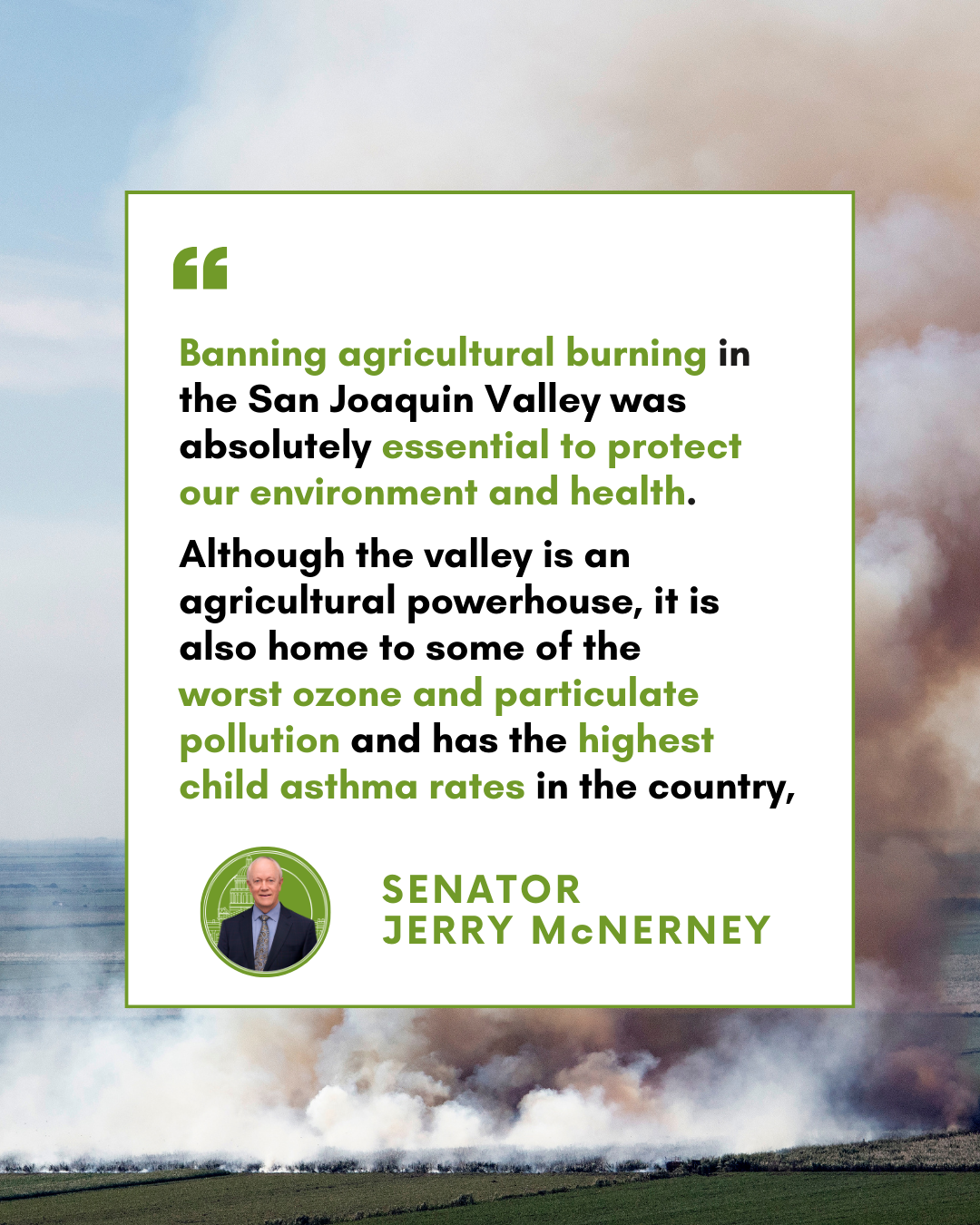Senator McNerney Introduces Environmental Bill to Help Farmers and Winegrape Growers
FOR IMMEDIATE RELEASE
February 5, 2025
CONTACT:
Robert Gammon, press secretary/policy adviser to Senator McNerney – (510) 289-2724
Erica Parker, Policy Associate, Californians Against Waste – (916) 443-5422
State Senator Jerry McNerney, D-Pleasanton, on Wednesday introduced new environmental legislation that is designed to benefit California farmers and winegrape growers. SB 279 would allow farms and vineyards to compost large amounts of green waste onsite — now that California has banned nearly all agricultural burning in the San Joaquin Valley.
“Banning agricultural burning in the San Joaquin Valley was absolutely essential to protect our environment and health. Although the valley is an agricultural powerhouse, it is also home to some of the worst ozone and particulate pollution and has the highest child asthma rates in the country,” said Sen. McNerney, who is a member of the Senate Agricultural Committee and whose district includes all of San Joaquin County. “SB 279 will provide California farms and vineyards with an eco-friendly alternative — the ability to compost large amounts of green waste onsite rather than having to ship it to another composting facility hundreds of miles away.”
SB 279 would also benefit community composting programs, urban farms, and school farms by allowing them to compost larger amounts of green waste onsite.
SB 279 is sponsored by Californians Against Waste, California Association of Winegrape Growers, Western Tree Nut Association, California Alliance for Community Composting, The Climate Center, and People Food & Land Foundation.
“Composting is essential for building healthy soils, fighting climate change, and reducing waste going to landfills,” said Erica Parker, policy associate, Californians Against Waste. “By expanding community composting capacity, increasing food waste diversion, and empowering our farmers with more composting options, we are not just tackling organic waste — we’re enriching our soil, supporting local economies, and helping our state meet its ambitious environmental goals.”
“Winegrape growers have long been committed to sustainability, including healthy soils and carbon sequestration through composting and other means,” said Michael Miiller, director of Government Relations for the California Association of Winegrape Growers. “As California faces the reality that we need to remove tens of thousands of acres of vineyards this year, composting onsite is an option that is especially important in the Central Valley, where open Ag burn is no longer an option.”
“Composting provides a unique and important opportunity for the agricultural industry to take sustainability to the next level if it can be done on a widespread basis. The Western Tree Nut Association welcomes this much-needed legislation as the key to achieving that goal,” said Roger Isom, president and CEO of Western Tree Nut Association.
Currently, when California farms and vineyards have large amounts of green waste, they typically must ship the material to a large composting facility, often hundreds of miles away. Unfortunately, California has a shortage of composting facilities. According to a recent report from CalRecyle, the state needs 50 to 100 additional organic waste recycling facilities to meet current demand. In addition, a nearly complete ban on agricultural burning in the San Joaquin Valley went into effect on Jan. 1.
SB 279 would allow:
Farmers and winegrape growers to compost onsite when they have large amounts of agricultural waste, such as when they remove an old orchard or vineyard, and combine their compost with agriculture waste from offsite;
Community composting, urban farms, and school farms to compost up to 500 cubic yards of green waste (they’re currently capped at 100 cubic yards.);
Incentivize the composting of food waste at medium-size composting facilities;
Composting operations to sell or give away up to 5,000 cubic yards of compost a year (farms and vineyards are currently capped at 1,000 cubic yards).
“Composting creates healthy soils that draw carbon out of the atmosphere, retain water, and increase food security. It also reduces climate pollution by preventing methane emissions,” said Baani Behniwal, Carbon Drawdown director, The Climate Center. “We are thrilled to work alongside Senator McNerney to pass this bill and help California farmers and communities increase compost production, contributing to a climate-safe future for all.”
“Community compost hubs with less than 500 cubic yards of material onsite are already exempt from state air and water quality permitting because they pose very little risk for causing adverse environmental impacts and public nuisance,” said Kourtnii Brown, CEO and co-founder of California Alliance for Community Composting. “We welcome legislation that proposes to increase the volume limit for composting activities excluded from state facility permitting processes to match these agency regulations. This will enhance opportunities for cities and counties to maximize their local composting capacity and create healthy compost closer to where the organic resources are generated and used, like at public parks and local farms.”
“This bill is a critical step toward expanding the availability of high-quality compost produced close to the source of organic feedstocks and applied in proximity to where it’s needed most,” said John Heywood, executive director, People, Food and Land Foundation. “Strengthening both the supply and demand for compost ensures that California’s organic resources are prioritized for soil regeneration, food system resilience, and climate action. Enabling the perpetual cycling of carbon and nutrients transforms organic waste into an asset—improving soil health, enhancing agricultural productivity, and supporting our state’s environmental and economic goals.”
###
Sen. Jerry McNerney is chair of the Senate Revenue and Taxation Committee and his 5th Senate District includes all of San Joaquin County and Alameda County’s Tri-Valley.



